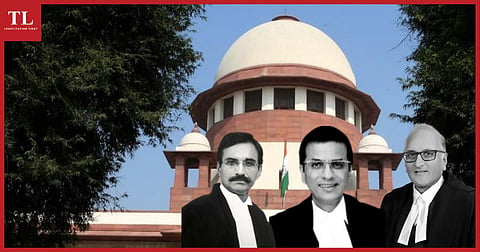

THE Supreme Court Friday expressed reservations on the Central Government's revised policy on vaccinations.
It said once the vaccination programme had been opened up for persons other than the 45 plus age group, it would not be logical to impose the obligation to source vaccinations for the 18-44 age group on the state governments.
"This will, inter alia, leave each state government to negotiate supply schedules, delivery points and other logistical arrangements with the manufacturers. At present, there are only two manufacturers for the authorized vaccines (with one other vaccine – Sputnik V, in the process of manufacture)", a bench led by Justice DY Chandrachud pointed out.
The bench which also had Justices L Nageswara Rao and Ravindra Bhat said Centre must take the responsibility of providing guidance to every state on the quantities to be supplied to them, the vaccine(s) being allocated, the period of delivery, and the number of persons who can be covered for vaccination, among other details.
"Leaving the state governments to negotiate directly with manufacturers will produce chaos and uncertainty. The object of vaccinating the 18-44 age group cannot be achieved in the absence of stocks being available", the court said.
It also expressed reservations on the Centre's vaccine pricing policy, pointing out that all vaccines, whether in the quantity of 50% purchased by the Central Government or the remaining 50%, were to be used for vaccinating citizens. "The end-user is the same".
As per the policy, Central Government proposes to purchase half of the total quantity falling within its 50% quota, while for the rest, the manufacturers would declare in advance the price to be fixed, allowing state governments to negotiate their terms.
The court said it is likely that compelling the state governments to negotiate with manufacturers on the ground of promoting competition and making it attractive for new vaccine manufacturers would result in a serious detriment to those in the age group of 18 to 44 years, who will be vaccinated by the states.
"The social strata of this age group also comprises persons who are bahujans or belong to other underprivileged and marginalized groups, like many in the other population age groups. They may not have the ability to pay", the court highlighted.
"Whether or not essential vaccines will be made available to them will depend upon the decision of each state government, based on its own finances, on whether or not the vaccine should be made available free or should be subsidized and if so, to what extent. This will create disparity across the nation", the court said.
The court pointed out to the Centre that the vaccinations being provided to citizens constituted a valuable public good.
"Discrimination cannot be made between different classes of citizens who are similarly circumstanced on the ground that while the Central government will carry the burden of providing free vaccines for the 45 years and above population, the state governments will discharge the responsibility of the 18 to 44 age group on such commercial terms as they may negotiate", it said.
The court, thus, said prima facie, the rational method of proceeding in a manner consistent with the right to life (which includes the right to health) under Article 21 would be for the Central Government to procure all vaccines and to negotiate the price with vaccine manufacturers.
"Once quantities are allocated by it to each state government, the latter would lift the allocated quantities and carry out the distribution", the court said.
In other words, the court explained, while procurement would be centralized, distribution of the vaccines across India within the states and union territories would be decentralized.
It thus asked the Centre to consider revisiting its current vaccine policy to ensure that it withstands the scrutiny of Articles 14 and Article 21 of the Constitution.
The court also directed the Centre to clarify the following issues in order to ensure the protection of the fundamental rights to equality and to life and personal liberty for all persons who will be eligible to take the vaccine from 1 May 2021-
These issues, the Court said, were of vital importance, since vaccination appears to be one of the most important strategies to combat the further spread of the pandemic, and would also provide a measure of security and assure the people about their health and well-being.